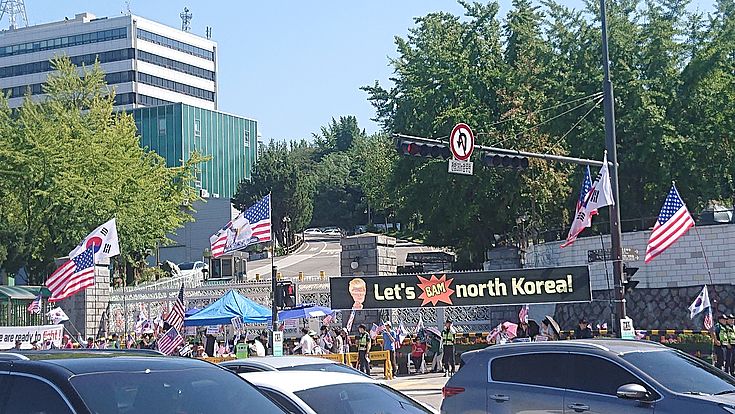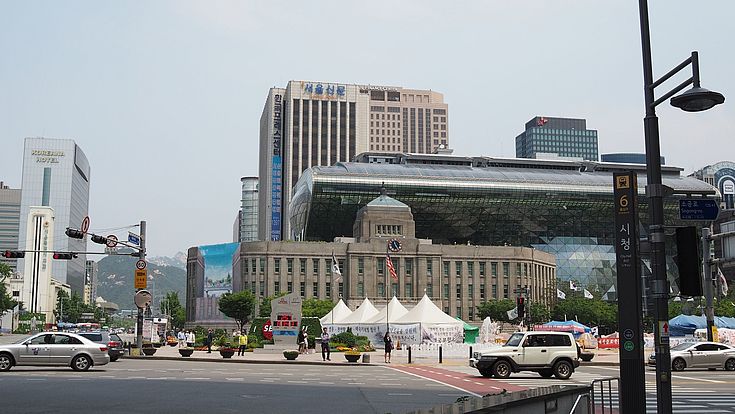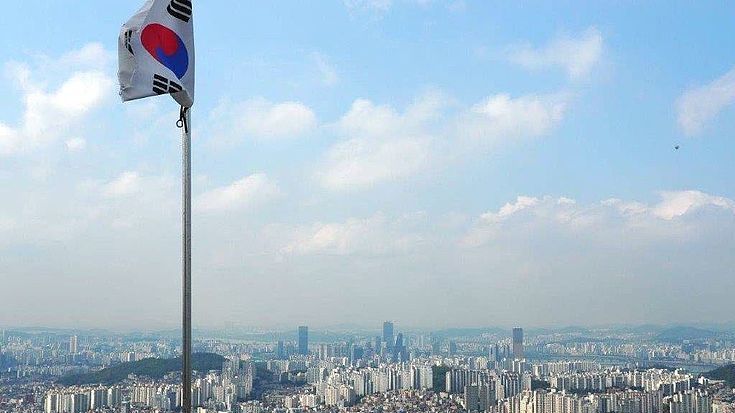Opinion
The US-Elections and the Korean Peninsula
The election victory of Joe Biden and the Democratic Party has been registered with great attention in South Korea, but without the malice towards President Trump that is widespread in Europe. In his congratulations, President Moon Jae-In spoke of the rock-solid, strong relations of the USA with South Korea in the alliance and ended his message with the words "Kacchi kapshida" (Let's go together!), sort of an alliance slogan that the future president Biden had previously used in an article of the Korean news agency Yonhap News.
Initiating Contacts
Foreign Minister Kang Kyung-hwa flew to Washington on Sunday (November 8) to hold regular consultations with Foreign Minister Mike Pompeo, emphasizing the normality and durability of the alliance on her departure. The economic prospects of a Biden presidency are seen predominantly positive, but there are clear sectoral differences and multiple concerns. In general, as it is probably the case worldwide, the hope is for a simpler partnership as well as a more multilaterally organized and less confrontational diplomacy. However, one can also see that many substantial positions, such as the opposition to China, will not significantly change.

Key Concerns of South Korea
The most important topic in South Korea is of course the question of what North Korea policy will look like in the future and how the military alliance with the USA will develop. Under President Trump there was a dynamic development of summit meetings, which most people did not expect at first. At the same time, the military alliance was very tense due to Trump's unacceptable demands for money. The summit diplomacy certainly helped President Moon, and shortly even put him in the role of a mediator between North Korea and the United States. North Korea, however, later denied this role when, after the meeting in April 2019, the agreement on the nuclear program failed and inter-Korean progress completely slowed down again.
On October 30, shortly before the elections, Biden had written an article for Yonhap News in which he explained the importance of the alliance for the USA, the contribution of Korean immigrants to the development of the USA and some principles of his future North Korea policy. He recalls feeling the tense situation of the Korean peninsula while visiting the DMZ in 2013 and underlines - thus indirectly criticizing President Trump - that he would never recklessly demand the withdrawal of US troops. He promises principled diplomacy and continued pressure on North Korea to denuclearize to ultimately achieve Korean unity.
Future US Foreign Policy
Biden has prepared himself for his future foreign policy with a team of over 2000 experts, who have worked on topics such as national security and arms control, defense, secret services, etc. in 20 different working groups. According to a report by Foreign Policy, above all, these included former members of the relevant institutions, e.g. Frank Kendall III and Christine Wormuth, former Under Secretaries of State of Defense. The Asia section was led by Ely Ratner, Executive Vice President and Director of Studies at the Center for a New American Security (CNAS), who had previously been Deputy National Security Advisor to Vice President Biden. He is expected to play a prominent role in Biden's future Asia policy.
Planned Talks
Biden himself has visited South Korea several times but has rarely met with President Moon. From the South Korean ruling party, Moon Chung-in, influential reunification advisor to President Moon, and the important MP Song Young-gil, have special relations with Biden, as have former UN Secretary-General Ban Ki-Moon and the two MPs Park Jin and Cho Tae-Yong from the opposition. As chairman of the Committee on Foreign Affairs and Reunification in the Korean National Assembly, Song Young-Gil intends to travel to the United States soon with other committee members to hold direct talks with the new president's team.

US North Korea Policy
All in all, it is assumed that the North Korea policy will become more "traditional" again and could resemble Obama's political approach of "strategic patience". This means, more emphasis will be placed on sanctions and multilateral coordination while meetings with the North Koreans will take place at operational level at best. The problem here is that the operational level in North Korea is not capable of making decisions, and patience has so far only led North Korea to increase provocations until there was a reaction. During the election campaign, Biden declared that he would only meet North Korean leader Kim Jong-un if denuclearization were to take place. For South Korea it is particularly important whether there are possibilities for a more independent North Korea policy which are not covered by sanctions, as desired by President Moon. Ultimately, this had not been successful under Trump - whether it will succeed under Biden, however, is unclear. If no meeting is held at all, this could even further limit South Korea's flexibility.
How Will North Korea React?
So far, North Korea has not yet reacted to Biden's election. Presumably, they want to be sure that he will actually take office amid President Trump not yet admitting his defeat in the election. Also, it is probably not yet clear how to deal with a President Biden. In the past, Biden had described Kim Jong-Un as a dictator and gangster while North Korea has spoken of a "man with a low IQ, eaten up by his ambitions”. That itself does not need to be a problem - such niceties were also exchanged with Trump. But a return to the politics of the Obama era is probably more seen as a deterioration of the situation. Moreover, if Joe Biden can really achieve this, an improvement in the relationship between the US and China could change China's current interest in supporting North Korea.

The US-South Korean Military Alliance
A clear improvement can be expected in the management of the military alliance. Trump had used brute force to demand and partially achieved a multiplication of the stationing costs of US troops in South Korea. In recent years, the so-called "Special Measures Agreement" has been a constant source of dispute. This year, the US initially demanded five billion US dollars, later 1.3 billion, which still represents a 50 percent increase of the 2019 contribution. It is unclear what will happen to the THAAD batteries that are stationed in South Korea to defend against North Korean but also Chinese missiles. They could fall victim to an agreement with China. Furthermore, it is unclear what will happen when operational control of the South Korean armed forces is transferred in the event of war. Right now, as a result of the Korean War, these forces are still subordinate to the USA. However, especially among the left-wing democrats, South Korea has been trying to change this for years. But since problems are constantly arising many experts assume that sufficient preconditions for this have yet to be made. Still, as this is a prestige project of the Moon government, this topic could now become a greater issue.
Perspectives for Economic and Trade Policy Perspectives
Far-reaching changes are also expected for economic and trade policy. South Korea is preparing for this with a working group of the relevant ministries and institutions. In general, a simpler approach especially in trade policy and a possible return of the United States to the Transpacific Partnership is assumed here. There will also be an important change in the environmental field, namely the return of the USA to the Paris Agreement and thus to climate protection. This, as well as the announced investments in renewable energies, initially appears to be a similar policy to that of President Moon with South Korea's "Green New Deal" and thus has a positive effect on South Korea. In South Korea, however, it is being closely monitored whether this could possibly be associated with greater pressure to not only offer CO2 reductions voluntarily but to make them a political requirement. For the South Korean economy, which is already suffering from excessive labor costs due to minimum wages, unemployment, and the Covid-19 crisis, the step from green rhetoric to actual CO2 reductions could be quite drastic.

Different Assessments on Joe Biden's Election
The impact of Joe Biden's election is therefore assessed very differently from sector to sector. Overall, "green stocks", e.g. in the renewable energy sector, are expected to profit from Biden's election victory. For oil refineries the situation could become more difficult if oil production in the USA is curtailed (e.g. fracking). Korean banks in the USA expect stricter regulation of their activities. For the technology sector and other industrial sectors, the relationship between the US and China is very crucial. Furthermore, there could also be relief in the technology sector where South Korean companies depend on cooperation with Chinese suppliers.
Outlook - More Multilateralism but no Complete New Policy
The election of Biden will lead the relationship of South Korea (as well as the whole world) with the USA into calmer waters. Many of the current problems, which are more influenced by the negotiating tactics of the USA, will disappear. However, probably none of the major trends that began under President Trump or were first made obvious by him will be easily reversed. Above all, this includes the difficult relationship between the USA and China. Although personal vanities may have played a certain role in this, the new Cold War is neither Trump's invention nor could it be reversed by Biden without abandoning a number of principles that are supposed to be crucial for him, and without abandoning important allies. The relationship with Japan and the emergence of the "Quad" (Quadrilateral Security Dialogue) remain interesting but difficult. Even though South Korea was invited to participate in the group out of consideration for China it decided not to join. Atmospherically, under President Biden it could become easier with China, also in the trade area. Whether this is enough to have an influence on North Korea policy remains uncertain and in my opinion is very unlikely.
For South Korea, as well as for Germany and other central powers, the new US administration will certainly be easier to handle. But perhaps South Korea then might again only be just one of several, mainly international, actors on the Korean peninsula. Progress in inter-Korean relations will then be more difficult to achieve. Hence, it will be crucial for South Korea to create a "policy-free" space for civil society action in which the goals of North Korea policy. Spaces in which action such as the creation of trust and human encounters between the two sides can be achieved even if interstate relations remain unchanged.
